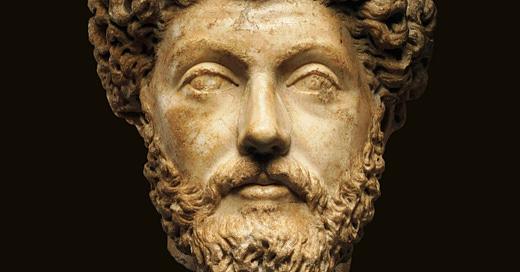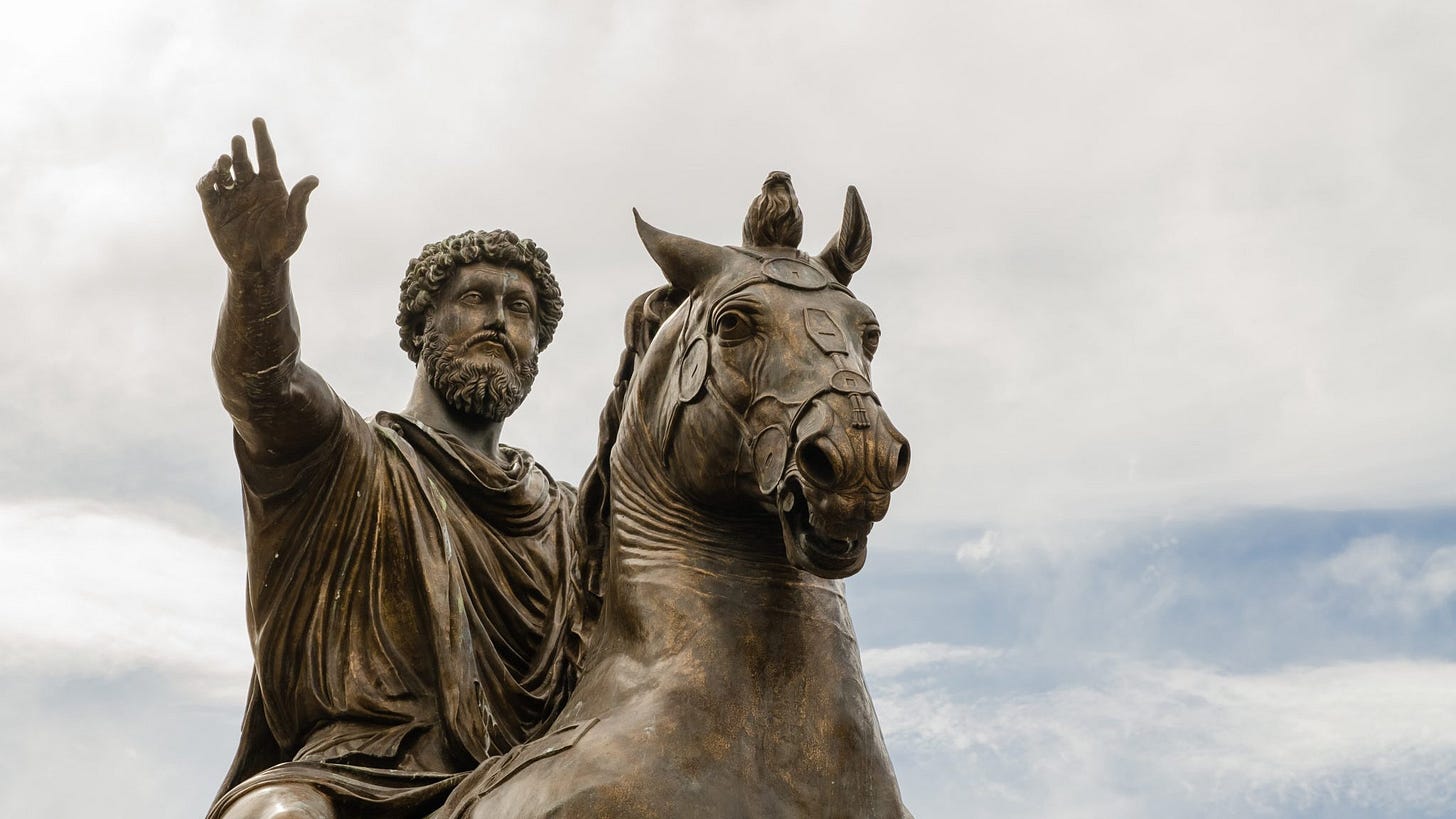Marcus Aurelius ruled at the height of the Roman Empire, commanding vast armies and overseeing affairs of state during years of war, plague, and political unrest. During the brief respites he had from the pressures of public life, he turned inward — writing down notes to himself on how to cultivate discipline, clarity, and moral strength.
The resulting work, today known as his Meditations, was never meant for publication. It is, among other things, a private record of Marcus Aurelius’ self-examination: an emperor’s disciplined attempt to live with reason, restraint, and integrity in the face of immense responsibility.
The wisdom that emerges from his writings doesn’t just paint the portrait of a philosopher-king, but provides a manual for stoic living. It is practical, unadorned, and remarkably modern in its insights.
Today, we examine five of Marcus Aurelius’ most enduring quotes — and explore what they can teach you about cultivating inner stability in a turbulent world…
Reminder: you can support our mission and get tons of members-only content for a few dollars per month:
Full-length articles every Wednesday and Saturday
Members-only podcasts and exclusive interviews
The entire archive of great literature, art and philosophy breakdowns
1. Don’t Talk, Do
“Waste no more time arguing what a good man should be. Be one.”
As emperor, Marcus Aurelius had no shortage of conversation with the greatest philosophers and scholars of the Roman elite, but he never mistook discussion for virtue. This quote reflects his firm conviction that philosophy isn’t about words, but action.
Aurelius believed that you don’t become good by talking about goodness; you become good by practicing it — moment by moment, and decision by decision. Here he reminds himself not to get stuck in theory or to waste time waiting for perfect conditions.
There is no better time than now to begin acting the way you know you should.
2. Live in the Present
“The sole thing of which any man can be deprived is the present; since this is all he owns.”
Marcus Aurelius often reminded himself that time was his most fragile possession. The past was fixed and the future was unknowable, so only the present moment could ever truly be called his.
In a life consumed by military campaigns and affairs of state, nobody understood better than the emperor the temptation to dwell on the past or fixate anxiously on the future. He regarded such distractions, however, as a loss of self-possession. To live well is to attend fully to the task at hand, taking ownership of your energy and focus.
For Marcus, anchoring the mind in the present wasn’t a form of escapism. Rather, it was the foundation of clarity and control — and ultimately, of freedom.
3. Focus On What You Can Control
“You have power over your mind — not outside events. Realize this, and you will find strength.”
At the heart of Stoicism is a simple division between the things you control, and the things you don’t. Marcus Aurelius returned to this distinction often — not as abstract theory, but as a practical tool for survival.
As emperor, Aurelius faced trials that would have broken most men: political unrest, personal betrayal, and the constant pressure of command. Many events were outside of his control, but what remained his alone was the power to interpret events, to choose how to respond, and to guard the integrity of his thoughts.
True strength, for Aurelius, did not depend on fortune or circumstance — rather, it derived from the control of his own thoughts, and the mastery of his mind.
4. Own Your Response
“You don’t have to turn this into something. It doesn't have to upset you. Things can’t shape our decisions by themselves.”
This line reveals Marcus Aurelius’ insistence on the need to separate external events from internal reactions. As emperor, he encountered daily frustrations: delays, conflicts, disappointments. But he knew that these things, in themselves, carried no significance. What mattered was the interpretation he chose to give them.
By refusing to let events dictate his state of mind, Aurelius preserved a crucial margin of freedom — the space to respond with reason, not impulse. He believed most suffering is self-inflicted, and that the majority of it can be avoided simply by staying calm, keeping perspective, and remaining sovereign over your own emotions.
5. Don’t Shy Away From Action
“You can also commit injustice by doing nothing.”
Stoicism is often associated with endurance and restraint, but Marcus Aurelius believed that justice required more than passivity. It demanded vigilance — and sometimes intervention.
In this quote, Aurelius makes it clear that silence in the face of wrongdoing is not neutrality, but is in fact a form of participation. As emperor, his failure to act could have consequences just as grave as any decree, so this idea is something he was intimately familiar with.
For Aurelius, moral responsibility extended beyond personal conduct. It included the duty to oppose injustice, even when action came at a cost.
To ignore evil and neglect your duty is a crime — especially when you are charged with defending others who count on you.
Thank you for reading!
Remember, you can support us and get members-only content every week: great literature, art, and philosophy breakdowns.
This weekend, we look into another of the great philosophers of Western culture, and how he’s so often misunderstood…








Anyone who thinks Stoicism is about detachment hasn’t read “Meditations” with their soul switched on. He wasn’t preaching serenity from a sunlit porch in Athens, he was wading through plague, betrayal, and the administrative equivalent of a Hydra. And still, he chose clarity over chaos, ethics over ego.
What I find most moving isn’t the wisdom which is obvious, but the fact that he wrote it all down for himself. No performance, no audience, just the raw, unfiltered attempt of a man trying to stay decent while holding the world together with one hand and his sanity with the other.
His words are a manual for inner sovereignty, not emotional anesthesia. And let’s be honest, the quote “Waste no more time arguing what a good man should be. Be one.” should be tattooed on every thinkpiece pundit and moral performance artist with a WiFi signal.
The older I get, the more I find myself returning to Marcus Aurelius for reminders, not for answers. The kind that slap and soothe you in the same breath.
This is an amazing article, extremely insightful.